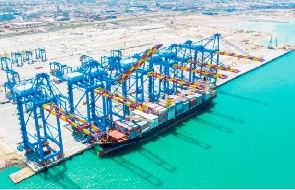The launch of the single continental market, the uptick in trade in the last part of a pandemic-laden year, and the conducive ports tariff regime signal a positive year for the freight forwarding business, Eddy Akrong, President of the Ghana Institute of Freight Forwarders (GIFF), has said.
Coronavirus-induced lockdowns slowed down freight forwarding for the most part of last year, but the pick-up in trade towards the end of the year was able to mitigate the impact of the pandemic.
“Now the outlook is better and we are hoping that [cargo] throughput goes higher. There should be a boom because we see things going up,” Mr. Akrong told Business24 in an exclusive interview.
The take-off of the continental market, which will see goods coming to Ghana from other African nations tariff-free and quota-free, and an expected surge in exports are additional fillips to the fortunes of freight forwarders this year.
“We [freighters and clearing agents] will be in there in terms of documentation for both imports and exports, clearing and distribution; this is basically what we do as architects of transport, and for us, this is exciting,” said Mr. Akrong.
“Looking at the reduction in tariffs for the goods that are going to be traded under the African Continental Free Trade Area (AfCFTA), we foresee a jump in exports, which will be very good for the economy—one that has been largely import-biased.”
Adding to these positive indicators is the discovery and movement of COVID-19 vaccines across countries, which further brightens the prospects for freight forwarders, who will be in the thick of things when it comes to distribution, according to the GIFF boss.
GIFF is currently building the capacity of its members to enable them take advantage of the opportunities that have been offered by the AfCFTA.
The Ministry of Trade is also preparing to train freighters and clearing agents on the modalities for trade, this paper gathered.
“We have applied for proper training for members for them to know how to go about business under the AfCFTA, because registration requirements and documentation will be mostly handled by freight forwarders and clearing agents on behalf of clients,” Mr. Akrong noted.
Business News of Wednesday, 20 January 2021
Source: thebusiness24online.net

















